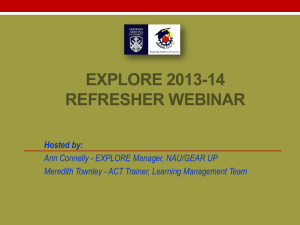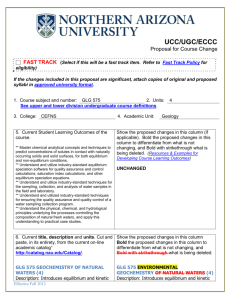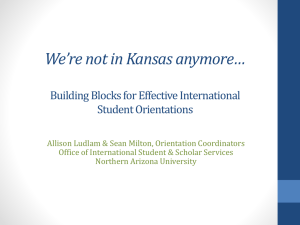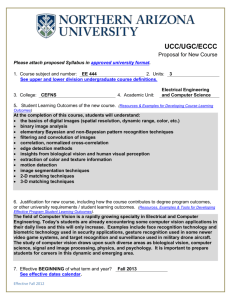GLG 475 - nau.edu - Northern Arizona University
advertisement
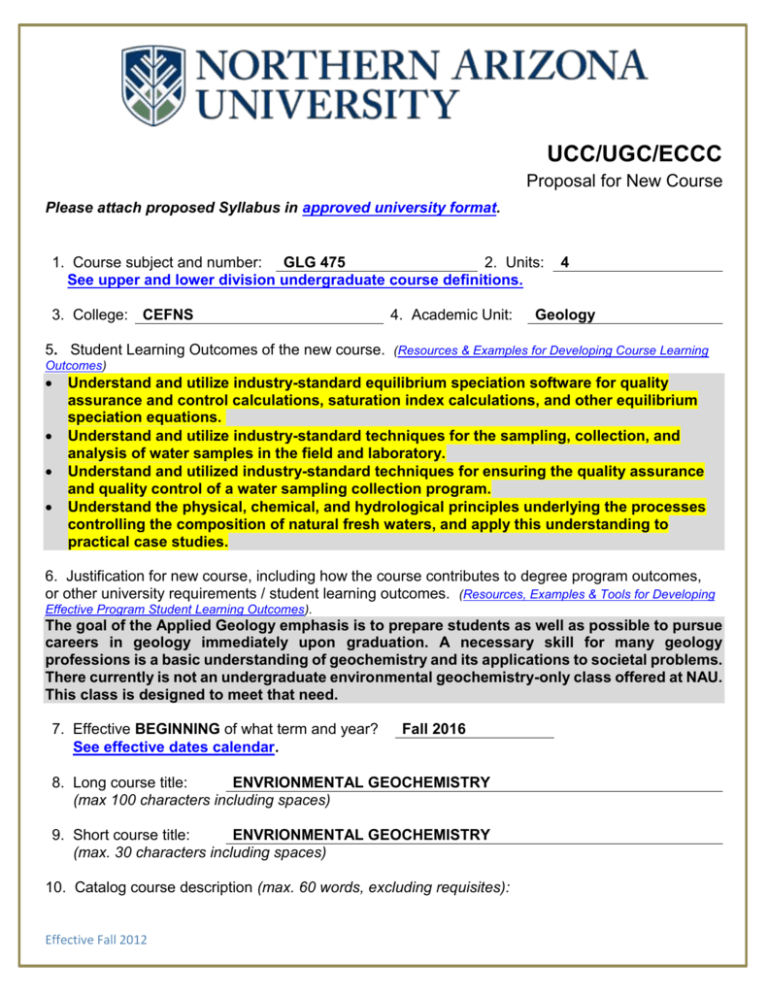
UCC/UGC/ECCC Proposal for New Course Please attach proposed Syllabus in approved university format. 1. Course subject and number: GLG 475 2. Units: See upper and lower division undergraduate course definitions. 3. College: CEFNS 4. Academic Unit: 4 Geology 5. Student Learning Outcomes of the new course. (Resources & Examples for Developing Course Learning Outcomes) Understand and utilize industry-standard equilibrium speciation software for quality assurance and control calculations, saturation index calculations, and other equilibrium speciation equations. Understand and utilize industry-standard techniques for the sampling, collection, and analysis of water samples in the field and laboratory. Understand and utilized industry-standard techniques for ensuring the quality assurance and quality control of a water sampling collection program. Understand the physical, chemical, and hydrological principles underlying the processes controlling the composition of natural fresh waters, and apply this understanding to practical case studies. 6. Justification for new course, including how the course contributes to degree program outcomes, or other university requirements / student learning outcomes. (Resources, Examples & Tools for Developing Effective Program Student Learning Outcomes). The goal of the Applied Geology emphasis is to prepare students as well as possible to pursue careers in geology immediately upon graduation. A necessary skill for many geology professions is a basic understanding of geochemistry and its applications to societal problems. There currently is not an undergraduate environmental geochemistry-only class offered at NAU. This class is designed to meet that need. 7. Effective BEGINNING of what term and year? See effective dates calendar. Fall 2016 8. Long course title: ENVRIONMENTAL GEOCHEMISTRY (max 100 characters including spaces) 9. Short course title: ENVRIONMENTAL GEOCHEMISTRY (max. 30 characters including spaces) 10. Catalog course description (max. 60 words, excluding requisites): Effective Fall 2012 This course is an introduction to the field of aquatic geochemistry or hydrogeochemistry as applied to Environmental problems in society. There are generally two types of senior level or graduate level aquatic geochemistry courses, those emphasizing quantifying processes at the microscopic and atomic scales, with an emphasis on laboratory investigations, and those emphasizing processes at the ecosystem level with an emphasis on field investigations. This course is of the latter type. The material covered over the course of the semester will draw upon both chemistry and geology. 11. Will this course be part of any plan (major, minor or certificate) or sub plan (emphasis)? Yes No If yes, include the appropriate plan proposal. Geology; B.S. 12. Does this course duplicate content of existing courses? Yes No If yes, list the courses with duplicate material. If the duplication is greater than 20%, explain why NAU should establish this course. Proposed co convene with GLG 575 13. Will this course impact any other academic unit’s enrollment or plan(s)? Yes No If yes, describe the impact. If applicable, include evidence of notification to and/or response from each impacted academic unit 14. Grading option: Letter grade Pass/Fail Both 15. Co-convened with: GLG 575 14a. UGC approval date*: (For example: ESE 450 and ESE 550) See co-convening policy. *Must be approved by UGC before UCC submission, and both course syllabi must be presented. 16. Cross-listed with: N/A (For example: ES 450 and DIS 450) See cross listing policy. Please submit a single cross-listed syllabus that will be used for all cross-listed courses. 17. May course be repeated for additional units? 17a. If yes, maximum units allowed? 17b. If yes, may course be repeated for additional units in the same term? Yes No Yes No CHM 151, CHM 152, Senior Status and Geology-Applied Geology 18. Prerequisites: Emphasis Major If prerequisites, include the rationale for the prerequisites. Basic chemistry courses must be taken in order to teach this GLG475 class at the appropriate senior level. 19. Co requisites: N/A If co requisites, include the rationale for the co requisites. Effective Fall 2012 20. Does this course include combined lecture and lab components? Yes If yes, include the units specific to each component in the course description above. 21. Names of the current faculty qualified to teach this course: No NEED 22. Classes scheduled before the regular term begins and/or after the regular term ends may require additional action. Review “see description” and “see impacts” for “Classes Starting/Ending Outside Regular Term” under the heading “Forms” http://nau.edu/Registrar/Faculty-Resources/Schedule-of-Classes-Maintenance/. Do you anticipate this course will be scheduled outside the regular term? Yes No 23. Is this course being proposed for Liberal Studies designation? If yes, include a Liberal Studies proposal and syllabus with this proposal. Yes No 24. Is this course being proposed for Diversity designation? If yes, include a Diversity proposal and syllabus with this proposal. Yes Answer 22-23 for UCC/ECCC only: FLAGSTAFF MOUNTAIN CAMPUS Scott Galland Reviewed by Curriculum Process Associate 3/12/2015 Date Approvals: Department Chair/Unit Head (if appropriate) Date Chair of college curriculum committee Date Dean of college Date For Committee use only: UCC/UGC Approval Approved as submitted: Approved as modified: Effective Fall 2012 Date Yes Yes No No No EXTENDED CAMPUSES Reviewed by Curriculum Process Associate Date Approvals: Academic Unit Head Date Division Curriculum Committee (Yuma, Yavapai, or Personalized Learning) Date Division Administrator in Extended Campuses (Yuma, Yavapai, or Personalized Learning) Date Faculty Chair of Extended Campuses Curriculum Committee (Yuma, Yavapai, or Personalized Learning) Date Chief Academic Officer; Extended Campuses (or Designee) Date Approved as submitted: Approved as modified: Effective Fall 2012 Yes Yes No No Environmental Geochemistry GLG 475/575 Instructor: Rod Parnell, Frier Hall 207 or ARD 124 523-3329 Rod.Parnell@nau.edu office hours Tu Th 11-12, W 2-3 or by appointment Course Prerequisites: Senior standing in Applied Geology major sub-plan or Graduate student. You should have had at least one semester of geology (and hopefully mineralogy) as well as a year of chemistry (and ideally quantitative chemistry). Course Description: This course is an introduction to the field of aquatic geochemistry or hydrogeochemistry as applied to Environmental problems in society. There are generally two types of senior level or graduate level aquatic geochemistry courses, those emphasizing quantifying processes at the microscopic and atomic scales, with an emphasis on laboratory investigations, and those emphasizing processes at the ecosystem level with an emphasis on field investigations. This course is of the latter type. The material covered over the course of the semester will draw upon both chemistry and geology. Course Student Learning Objectives: Understand and utilize industry-standard equilibrium speciation software for quality assurance and control calculations, saturation index calculations, and other equilibrium speciation equations. Understand and utilize industry-standard techniques for the sampling, collection, and analysis of water samples in the field and laboratory. Understand and utilized industry-standard techniques for ensuring the quality assurance and quality control of a water sampling collection program. Understand the physical, chemical, and hydrological principles underlying the processes controlling the composition of natural fresh waters, and apply this understanding to practical case studies. Text Books: Drever, 4th edition is the only required textbook for this course and is newly available in print. A more detailed and higher level text, Stumm and Morgan is on reserve in the lab (room 208 Frier Hall) and we can quickly order more copies. Do not remove my copy from that room. The Treatise on Geochemistry, Volume 5 is a nice overview of the current state of hydrogeochemistry. The Water Supply Paper by Hem, although getting old, is a nice overview of water types and the practical side of hydrogeochemistry. Drever, J. I. 2014.Geochemistry of Natural Waters, 4th edition. (Stumm, W. and J. Morgan. 1996. Aquatic Chemistry. 3rd edit.supplemental) Drever, J. I. (editor). 2005. Surface and Ground Water, Weathering, and Soils. Treatise on Geochemistry. Volume 5. Elsevier. 626 pp. Hem, J.D. 1989. Study and Interpretation of the Chemical Characteristics of Effective Fall 2012 Natural Water. U.S. Geol. Survey Water Supply Paper 2254. (cheap and practical intro to hydrogeochemistry) Available at http://water.usgs.gov/pubs/wsp/wsp2254/pdf/wsp2254a.pdf The required lab manual is the National Field Manual for the Collection of Water-Quality Data, Techniques of Water-Resources Investigations Book 9, Handbooks for Water-Resources Investigations. Chapter A6 You can download it at http://water.usgs.gov/owq/FieldManual/ Finally, we will read some journal articles by Fritz, Malusa et al., Marks et al., Crossey et al., and Selmants and Hart. These will be added to BBLearn as pdfs. The course closely follows the materials in Drever’s text and it is designed for geology, biology, and forestry graduate students. Stumm and Morgan is more detailed, more comprehensive, more rigorous, and more oriented toward chemistry and environmental engineering. Evaluation Methods and Deadlines: There will be two hour exams and one final exam. You will also be responsible for turning in 5-6 homework sets and laboratory exercises. The homeworks will not be graded if you are enrolled in GLG 475, but will be important to complete before we go over them in lab. Graduate students enrolled in GLG 575 will have their homeworks graded. I expect a cooperative effort on the homework assignments (i.e feel free to work together on problem-solving) However, each person must turn in their own work. The lab exercises will be graded and must be your own work. Required Field Trips: There will be two weekend, day long field trips to Fossil Creek near Strawberry, AZ, and along Beaver Creek in the Verde Valley. These trips are required (unless arrangements are made with me in the first week of class) and will be scheduled for some time in March or early April during the first class period. Course Policies Class Attendance and Exams Students are expected to assume full responsibility for class attendance and are responsible for all work missed due to absences. The instructors are under no obligation to make special arrangements for a student who has been absent unless such absences have been excused by a formal institutional excuse. Therefore, if you must be absent on an exam or group activity day, you must notify one of us, and we must reach an agreement that the absence is excusable and that there is some way you can make up the work (that means talking or emailing with us, not just leaving us a message) at least a day before the exam. If you do not do this prior to the exam, and you miss the exam, you will receive a “0” for the test. Institutional Excuses permit students to be absent from classes in order to represent the university at athletic, extracurricular, or academic activities. These excuses must be approved and signed by the Associate Vice President for Academic Affairs, the Dean of Students, and the dean of the college in which the course is being offered. Institutional excuses must be presented to the instructors before the absence takes place. Effective Fall 2012 Office hours This course will be an introduction to an entirely new field for many of you. So, please do come see me whether you are doing well or poorly. If you cannot make my office hours, make an appointment with me. If you come by my office not during office hours but I have the door open, ask if it is an okay time to meet. Don’t feel offended if I say it is not, but the odds are that I can meet with you right then. Please don’t try to see me immediately before lecture or lab, I get cranky as I prepare lecture. Late Papers: Will not be accepted. Plagiarism and Cheating Any form of misconduct including cheating, fabrication, fraud, dishonesty and plagiarism will not be tolerated. Violators will be subject to a failing grade in the course. Students are encouraged to work and study together outside of class, but all work turned in for a grade must be completed only by the student (or students, on the group assignments) submitting the work. Please see the Student Code of Conduct and the section on Academic Dishonesty in the Northern Arizona University Student Handbook. Challenges to Assigned Grades Challenges to assigned grades are welcomed because they demonstrate that you are seriously thinking about the material in the course. However, we will only consider challenges in writing. Our hope is that written challenges will accomplish two goals: (1) a written format provides you with the opportunity to present an articulate and well considered argument (and therefore increase the likelihood that we will favor your challenge with an improved grade); and (2) a written request provides a record of the grade transaction in case there are questions at a later time. Challenges must be submitted within one week of the return of a graded assignment. Incompletes University policy prohibits the assignment of an “incomplete” grade except in extreme circumstances that are beyond the student’s control. To receive an incomplete requires the processing of a formal contract between the student and the faculty member documenting how and when the missing course materials will be completed. Withdrawals The last day to drop/delete without a W and without a fee is January 26 (with a fee you can drop without a w through February 9). The last day for Drop/Delete is and for drop with a W is March 16. Audits To receive an official audit for this course, attendance in lecture and laboratory is required. Class attendance Students must assume full responsibility for class attendance, which is mandatory. Individuals are responsible for all work missed by class absence. Institutional excuses permit students to be absent from classes to represent the University at athletic, extracurricular, or academic activities. These Effective Fall 2012 must be approved and signed by the Associate Vice President for Academic Affairs, the Dean of Students, and the Dean of the pertinent College, and presented to me before the absence. Special needs Students with physical handicaps or learning disabilities who need to make special arrangements for class assignments should consult me within the first two weeks of the semester. At any time, I encourage students to come to me for help in understanding the readings, lecture-discussions, writing assignments, or for other course-related assistance. All that I ask is that you respect office hours. If you can not make my scheduled office hours, I can make an appointment to see you at another time (for example, you could make an appointment by calling or speaking to me after or before class). Remember, that my telephone has voice mail, so you can always leave a message. My e-mail is Rod.Parnell@nau.edu. Grades The course grade will be based entirely on your exam scores and laboratory exercise reports. You will be expected to turn in a report for each laboratory exercise assigned. While cooperation in understanding the lab material is fine, each report must be entirely your own work. Evidence of plagiarism will result in a failing grade for that report. Class attendance is mandatory. Final grades will be assigned on your standing relative to the highest point total by a student in the class. For example, student A receives more points over the course of the semester than anyone else: 790 points. Student B receives 689 points. Student A gets 100% and an A; student B gets 689/790 = 87% , and gets a B. Grades will be assigned as follows: 90 - 100% = A 80 - 89.9% = B 70 - 79.9% = C 60 - 69.9% = D Below 60% = F Your final grade will be based upon the following point schedule: GLG 475, for undergraduate students 2 hourly exams (100 points each) 1 final exam laboratory (10-15 points each) final project TOTAL 200 points 100 points 60 points 40 points 400 points GLG 575, for graduate students 2 hourly exams (100 points each) 1 final exam laboratory (10-15 points each) homeworks (5 points each) equilibrium speciation modeling exercises final project TOTAL 200 points 100 points 60 points 30 points 10 points 120 points 520 points Homework will be assigned during lecture for Graduate Students only. Solutions will be provided during homework review sessions. Please do these problems. You will find they closely resemble exam questions. Effective Fall 2012 The exams will be closed book and closed notes and must reflect your own understanding of course principles. Any cheating on an exam will result in a 0 for that exam and possible additional disciplinary action. The final exam will focus on the last third of the semester. Laboratory Your laboratory is essential to your developing an understanding concerning the procedures which environmental professionals utilize. It is where you will gain important practical experiences without having to listen to me drone on and on. Late laboratory assignments are strongly discouraged. For each week that an assignment is late, 10% of the grade will be deducted. Labs will consist of in-class laboratory, computer exercises, and field trips. There are two required field trips for this course. Attendance is required because it is the best way to learn the practical applications of material presented and because it is a great opportunity to learn in more detail from me and your peers than you could ever get in a class or lab setting. The dates below are tentative but are our best estimates. If any dates should change I will inform you immediately. Please let me know if you have any conflicts with these dates at the first class meeting. TRAVERTINE DEPOSITION AND CARBONATE SYSTEM DISEQUILIBRIA IN FOSSIL CREEK all day Saturday or Sunday in March BEAVER CREEK all day Saturday or Sunday in March or early April. Final project Both undergraduate and graduate students will complete final projects based upon the field trips and subsequent laboratory analyses of the samples taken. The graduate student projects will be more work in the following ways: (i) they will work with equilibrium speciation computer models for additional depth in the interpretation and analysis of these samples, (ii) they will complete a more indepth project with more analyses run, (iii) the final report for their project will be longer reflecting the greater amount of work on the project. Their project reports will have this additional modeling component to them. Lecture topics and reading assignments are given in a separate spreadsheet. NORTHERN ARIZONA UNIVERSITY POLICY STATEMENTS FOR COURSE SYLLABI SAFE ENVIRONMENT POLICY NAU’s Safe Working and Learning Environment Policy prohibits sexual harassment and assault, and discrimination and harassment on the basis of sex, race, color, age, national origin, religion, sexual orientation, gender identity, disability, or veteran status by anyone at this university. Retaliation of any kind as a result of making a complaint under the policy or participating in an investigation is also prohibited. The Director of the Office of Affirmative Action & Equal Opportunity (AA/EO) serves as the university’s compliance officer for affirmative action, civil rights, and Title IX, and is the ADA/504 Coordinator. AA/EO also assists with religious accommodations. You may obtain a copy of this policy from the college dean’s office or from the NAU’s Affirmative Action website nau.edu/diversity/. If you have questions or concerns about this policy, it is important that you contact the departmental chair, dean’s office, the Office of Student Life (928-523-5181), or NAU’s Office of Affirmative Action (928) 523-3312 (voice), (928) 523-9977 (fax), (928) 523-1006 (TTD) or aaeo@nau.edu. STUDENTS WITH DISABILITIES If you have a documented disability, you can arrange for accommodations by contacting Disability Resources (DR) at 523-8773 (voice) or 523-6906 (TTY), dr@nau.edu (e-mail) or 928-523-8747 (fax). Students needing academic accommodations are required to register with DR and provide required Effective Fall 2012 disability related documentation. Although you may request an accommodation at any time, in order for DR to best meet your individual needs, you are urged to register and submit necessary documentation (www.nau.edu/dr) 8 weeks prior to the time you wish to receive accommodations. DR is strongly committed to the needs of student with disabilities and the promotion of Universal Design. Concerns or questions related to the accessibility of programs and facilities at NAU may be brought to the attention of DR or the Office of Affirmative Action and Equal Opportunity (523-3312). ACADEMIC CONTACT HOUR POLICY Based on the Arizona Board of Regents Academic Contact Hour Policy (ABOR Handbook, 2-224), for every unit of credit, a student should expect, on average, to do a minimum of three hours of work per week, including but not limited to class time, preparation, homework, studying. ACADEMIC INTEGRITY Integrity is expected of every member of the NAU community in all academic undertakings. Integrity entails a firm adherence to a set of values, and the values most essential to an academic community are grounded in honesty with respect to all intellectual efforts of oneself and others. Academic integrity is expected not only in formal coursework situations, but in all University relationships and interactions connected to the educational process, including the use of University resources. An NAU student’s submission of work is an implicit declaration that the work is the student’s own. All outside assistance should be acknowledged, and the student’s academic contribution truthfully reported at all times. In addition, NAU students have a right to expect academic integrity from each of their peers. Individual students and faculty members are responsible for identifying potential violations of the university’s academic integrity policy. Instances of potential violations are adjudicated using the process found in the university Academic Integrity Policy. RESEARCH INTEGRITY The Responsible Conduct of Research policy is intended to ensure that NAU personnel including NAU students engaged in research are adequately trained in the basic principles of ethics in research. Additionally, this policy assists NAU in meeting the RCR training and compliance requirements of the National Science Foundation (NSF)-The America COMPETES Act (Creating Opportunities to Meaningfully Promote Excellence in Technology, Education and Science); 42 U.S.C 18620-1, Section 7009, and the National Institutes of Health (NIH) policy on the instruction of the RCR (NOT-OD-10-019; “Update on the Requirement for Instruction in the Responsible Conduct of Research”). For more information on the policy and the training activities required for personnel and students conducting research, at NAU, visit: http://nau.edu/Research/Compliance/Research-Integrity/ SENSITIVE COURSE MATERIALS University education aims to expand student understanding and awareness. Thus, it necessarily involves engagement with a wide range of information, ideas, and creative representations. In the course of college studies, students can expect to encounter—and critically appraise—materials that may differ from and perhaps challenge familiar understandings, ideas, and beliefs. Students are encouraged to discuss these matters with faculty. CLASSROOM DISRUPTION POLICY Membership in the academic community places a special obligation on all participants to preserve an atmosphere conducive to a safe and positive learning environment. Part of that obligation implies the responsibility of each member of the NAU community to maintain an environment in which the behavior of any individual is not disruptive. Instructors have the authority and the responsibility to manage their classes in accordance with University regulations. Instructors have the right and obligation to confront disruptive behavior thereby promoting and enforcing standards of behavior necessary for maintaining an atmosphere conducive to teaching and learning. Instructors are Effective Fall 2012 responsible for establishing, communicating, and enforcing reasonable expectations and rules of classroom behavior. These expectations are to be communicated to students in the syllabus and in class discussions and activities at the outset of the course. Each student is responsible for behaving in a manner that supports a positive learning environment and that does not interrupt nor disrupt the delivery of education by instructors or receipt of education by students, within or outside a class. The complete classroom disruption policy is in Appendices of NAU’s Student Handbook. Effective Summer 2014 Approved UCC – 1/28/14 Approved UGC – 2/12/14 Effective Fall 2012
